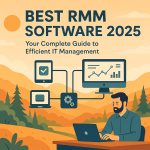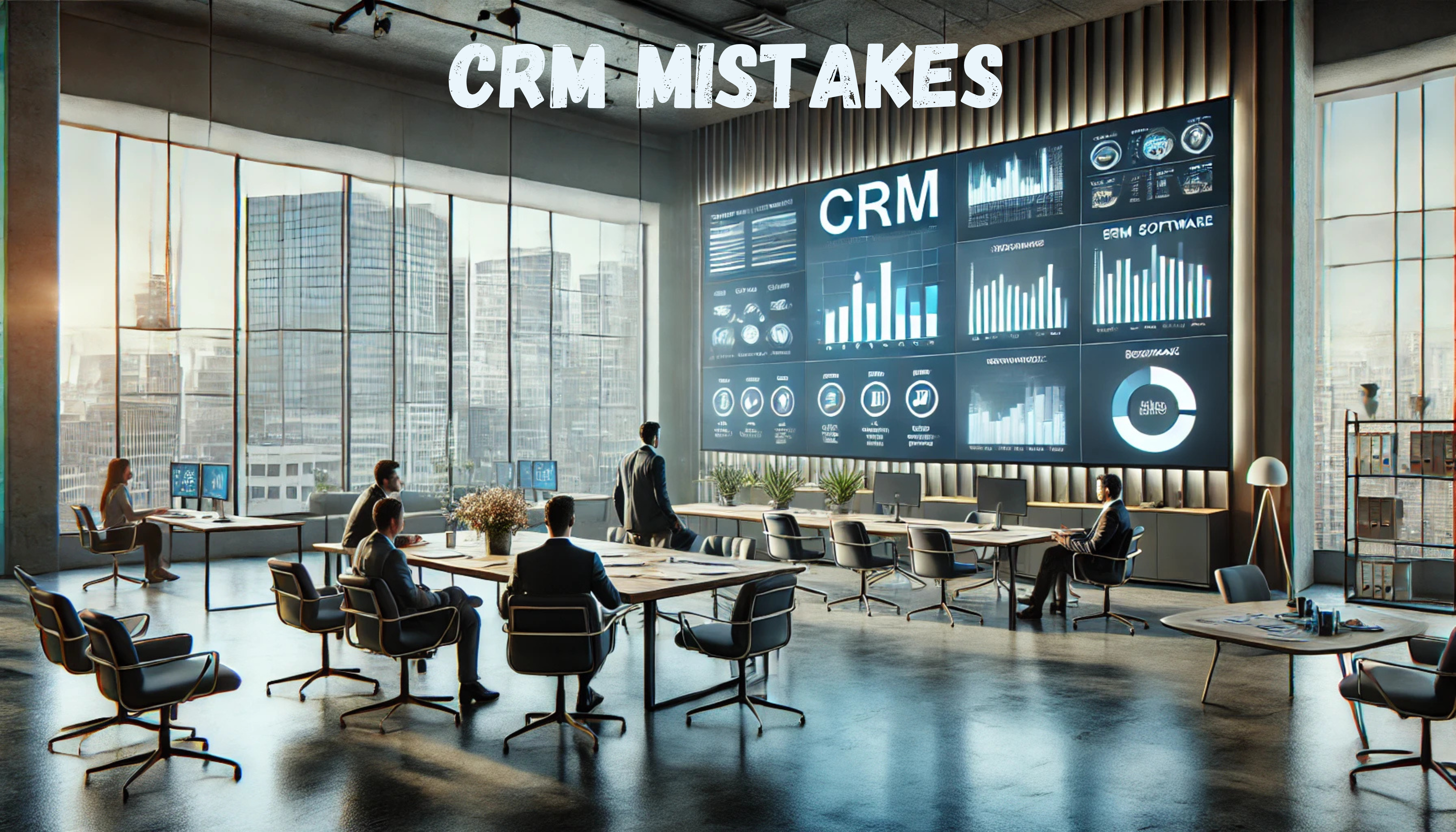What is a CRM Tool? Boost Your Business Efficiency
In today’s fast-paced world, having a good CRM tool is key. CRM stands for customer relationship management. It helps companies manage their interactions with current and potential customers. CRM technology lets businesses stay in touch with customers, make processes smoother, and boost profits.
CRM software gives businesses tools to improve communication. It brings together customer and company data from different places. Some CRM tools even use artificial intelligence (AI) to manage customer relationships better, across marketing, sales, digital commerce, and customer service.
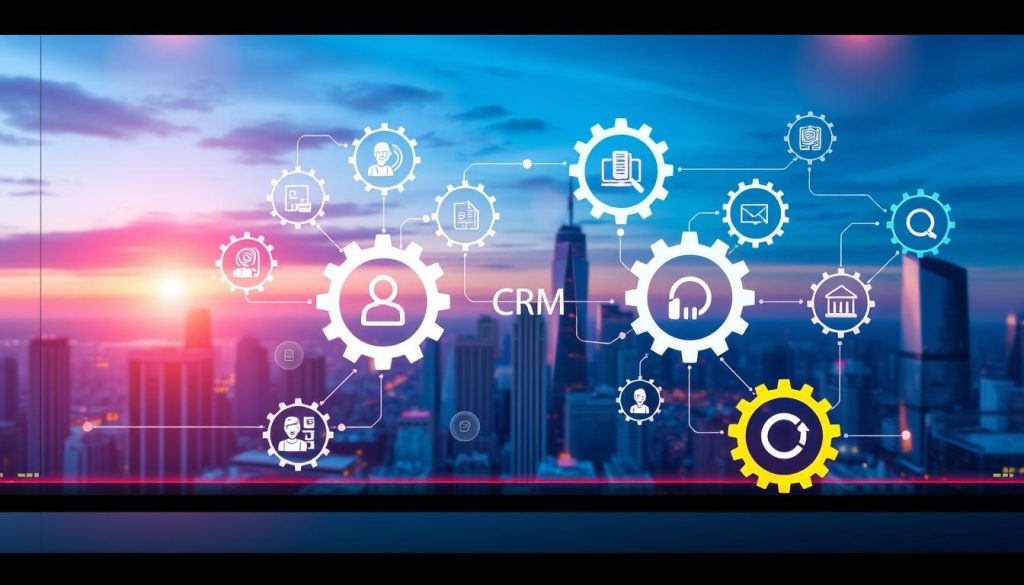
Using a strong CRM system helps organizations in many ways. It gives them a single place for customer info, automates tasks, and offers insights for making smart decisions. This leads to a better customer experience, more loyalty, and higher sales.
Key Takeaways
- CRM is a system that helps businesses manage customer relationships and interactions.
- CRM software unifies customer data from multiple sources and can utilize AI to enhance customer experience.
- A CRM tool can streamline processes, improve communication, and provide valuable insights for better decision-making.
- Implementing a CRM system can lead to increased customer loyalty and revenue growth.
- CRM technology is essential for businesses looking to boost their efficiency and competitiveness in the market.
Benefits of Using a CRM Tool
Using a customer relationship management (CRM) tool can greatly benefit your business. It helps you build better customer relationships, keep customers coming back, and increase your sales and revenue.
Improved Customer Relationships
A CRM gives you a detailed look at each customer’s info, what they’ve bought, and how they’ve interacted with you. This lets you serve them better, creating stronger bonds with your customers.
Increased Customer Loyalty
Customers who feel appreciated and supported tend to stay loyal. A CRM helps you understand what your customers want, so you can meet their needs before they even ask. This keeps them coming back and buying from you again.
Boosted Sales and Revenue
With a CRM, you can see how customers behave and what they might want to buy next. This information helps your sales team make smarter choices, leading to more sales and growth for your business.
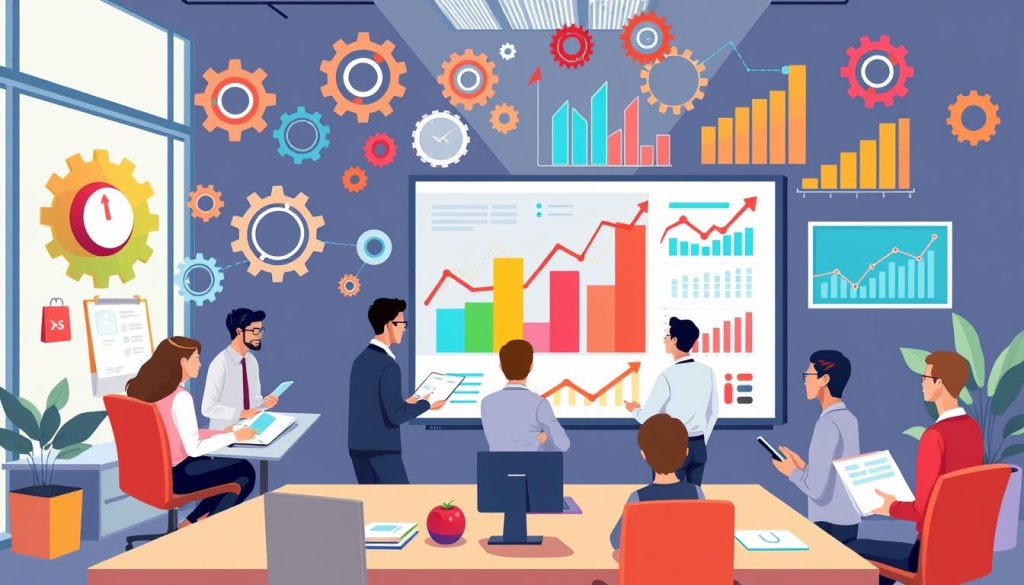
| Benefit | Impact |
|---|---|
| Improved Customer Relationships | Personalized service, stronger connections |
| Increased Customer Loyalty | Higher retention, repeat business |
| Boosted Sales and Revenue | Increased revenue, business growth |
By using a CRM tool, you can unlock the full potential of your customer relationships. This drives business success and helps your business grow over time.
Understanding Customer Behavior with Analytics
At the heart of a successful business is knowing how customers behave. CRM analytics help us understand how people interact with our products and services. This knowledge lets us make better decisions and serve our customers better.
We collect data from many places, like customer records and social media. This data shows us what customers like and what they don’t. We can then tailor our offerings and marketing to meet their needs, increasing loyalty and engagement.
- Personalization in digital marketing can prevent up to 41% of customers from switching to competitor brands.
- CRM software can aid in segmenting audiences based on behavior and tracking customer responses to ads, leading to improved audience segmentation.
- Customer behavior can be categorized into four types: Habitual, Variety-seeking, Dissonance-reducing, and Complex.
Our CRM analytics do more than just collect data. They turn that data into useful insights. With tools like data mining and predictive modeling, we find trends and meet customer needs. This helps us make smarter business choices.
As we improve our CRM analytics, we get to know our customers better. This lets us give them better experiences, which builds loyalty and growth. By listening to what our customers want, we keep our products and services relevant and competitive.
“71% of customers now expect personalization when they shop. Regular customer behavior analysis helps in understanding if existing customers are satisfied with product offerings and if they are making repeat purchases.”
Our CRM strategy focuses on using data to understand and serve our customers. By using CRM analytics, we improve our business and strengthen our relationship with our customers.
Streamlining Processes and Workflows
A good CRM system can change your business for the better. It helps make key processes smoother across different departments. By using marketing automation and sales tools, a CRM can make many tasks easier and less time-consuming. This lets your teams focus on activities that bring in more money.
Marketing Automation
Marketing automation in a CRM can change how you get leads and manage customer journeys. It automates emails, scores leads, and uses triggers based on behavior. This helps you guide prospects better, leading them to buy. With a CRM, you can give customers a personal touch without losing efficiency.
Sales Process Optimization
Sales teams also see big benefits from a CRM. It automates tasks like assigning leads and tracking pipelines. This lets sales reps spend more time with customers. Advanced CRM tools also give insights into team performance, helping you find your best salespeople and improve your sales.
| Key Benefits of Streamlining Processes and Workflows with a CRM |
|---|
| Increased productivity and efficiency across teams Reduced errors and improved data accuracy Better visibility and transparency into business operations Improved customer communication and engagement Enhanced scalability and cost-effectiveness |
By streamlining processes and workflows, marketing automation, and sales process optimization, a CRM can help your business grow. The right CRM can make your team more productive, efficient, and happy with customers.

Effective Communication and Lead Nurturing
A good CRM system changes how you talk to customers and grow leads. It keeps all customer info in one place. This way, your team can work better together, giving customers a great experience every time.
CRMs are great at helping you nurture leads. They use automated steps and personal messages to keep in touch with people. This can make it more likely for them to become loyal customers. In fact, top companies get 50% more sales-ready leads at a 33% lower cost per lead, says Forrester Research.
Also, it takes an average of 8 interactions for a customer to buy. A CRM helps guide them through this process. It moves them through the sales funnel smoothly and efficiently.
| Stage | Focus | Objective |
|---|---|---|
| TOFU | Awareness and Interest | Attract and engage potential customers |
| MOFU | Consideration and Evaluation | Nurture and educate leads |
| BOFU | Decision and Purchase | Convert leads into paying customers |
With a CRM, you can focus on the best leads. You can send messages that really speak to them. This can make your conversion rates go up by as much as 200%.
In today’s world of crm for customer service, talking to customers and nurturing leads is key. A CRM can make your work easier, improve how you talk to customers, and help your business grow.
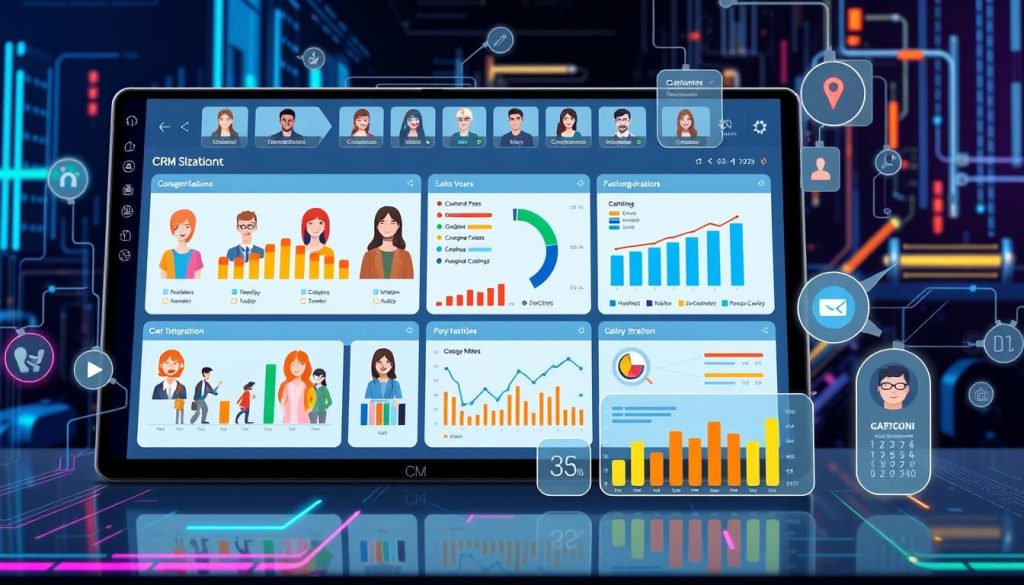
Targeted Marketing and Product Development
A CRM (Customer Relationship Management) system is a powerful tool for targeted marketing campaigns and tailoring your product offerings. It helps you understand your customers better. This way, you can send the right messages to the right people at the right time.
This approach boosts customer satisfaction and loyalty. It shows you really get what they need and like. Studies show customer-led marketing can increase Customer Lifetime Value by 33% on average. CRM marketing automation also improves customer relationships with your brand.
Personalized Approach
CRM data offers insights into what your customers like and don’t like. This lets you create personalized marketing campaigns that really speak to them. Personalized emails can increase open rates and keep customers coming back.
CRM integration helps you analyze customer data. This way, you can adjust your marketing to fit their changing needs.
Meeting Customer Needs
CRM data helps you understand your customers better. It shows trends and patterns that guide your product development. This knowledge helps you meet customer needs better, leading to happier customers and more sales.
CRM software also reveals customer behavior insights. This helps in creating new products and improving marketing and customer service. Integrating CRM with other systems gives a complete view of your customers. This helps make decisions that meet their needs.
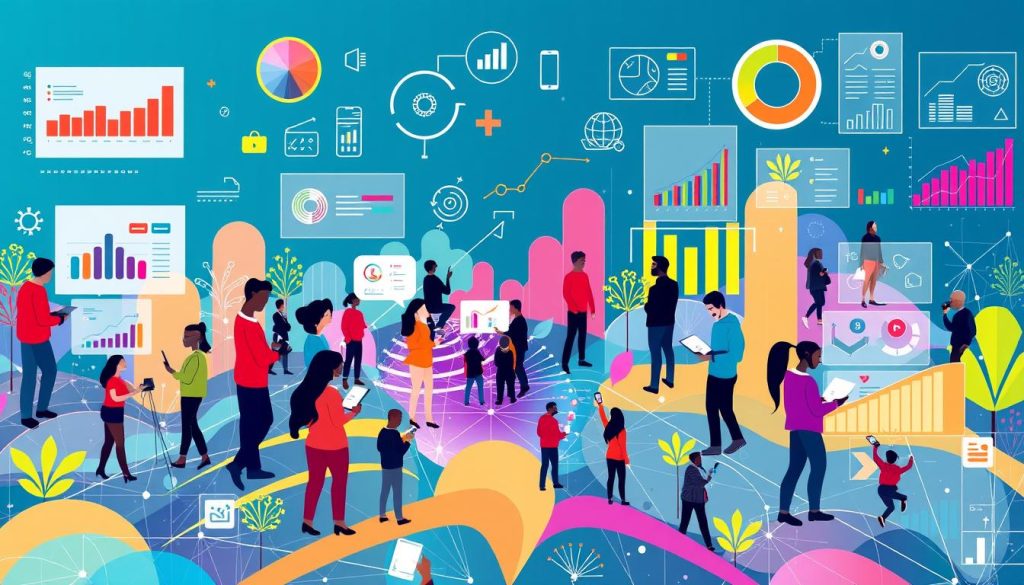
Identifying Profitable Customers
Understanding and nurturing our most valuable customers is crucial for any business. A CRM system is a powerful tool for this. It helps us find our profitable customers and focus on them.
A CRM system analyzes data like purchase history and customer lifetime value. It segments our customers, helping us focus on those who bring in the most revenue. This approach boosts sales, loyalty, and our bottom line.
Research shows that 80% of sales for most businesses come from repeat customers. A CRM system helps us understand and keep these valuable clients. This ensures we keep their business and build lasting relationships.
CRM for customer segmentation also lets us tailor our efforts to different customer groups. This personalized approach increases satisfaction and engagement. It helps us find and keep profitable customers that grow our business.

Using a CRM system gives us deep insights into our customers. This helps us make decisions that maximize the value of our most profitable relationships. This focus can change the game for our business, setting us up for long-term success.
Industries Benefiting from CRM
Customer Relationship Management (CRM) tools are key for many businesses. They help in retail, financial services, and consulting. These tools change how companies talk to customers and make things run smoother.
Retail
CRM is a big deal in retail. It connects different parts of a store, like production and finance. This lets retailers know what customers like and do.
With this info, they can make shopping better, keep customers coming back, and sell more. CRM makes sales teams 34% more productive and sales 41% higher.
Financial Services
Financial services firms are also using CRM. Banks and others use it to help customers and make their experience better. CRM helps sales teams find the best leads to sell to.
Consulting
Consulting firms use CRM too. It helps them keep track of clients and projects. CRM also makes it easier to find new chances.
CRM makes data better for sales and marketing. It helps firms focus on the most important leads. This means they can act fast on the best opportunities.
CRM is great for any business that needs to handle customer interactions and data. It helps grow and work better. Using CRM well means better relationships with customers, better sales management, and smarter decisions.
Challenges of Implementing a CRM
Customer relationship management (CRM) systems bring many benefits. Yet, businesses face several challenges when using them. One major issue is user adoption. It’s key to get employees to use the CRM regularly. Without it, data quality suffers, leading to poor insights.
Keeping data quality high is vital for CRM success. Bad data can hurt decision-making and CRM effectiveness. In fact, 44% of respondents lose 10% of their annual revenue due to poor data quality on CRMs.
Cost and ROI
The cost of a CRM system is a big worry for businesses. Prices vary from $10 to $20 per user per month for basic plans. Enterprise-level CRMs can cost up to $300 per user per month. For a medium-sized company, the yearly cost of an enterprise CRM could be $1.08 million.
Showing a clear return on investment (ROI) is key for CRM adoption. CRMs can offer $8.71 in ROI for every $1 spent. Yet, 52% of sales leaders report that their CRM costs them opportunities. Good planning and deployment are crucial for a positive ROI.
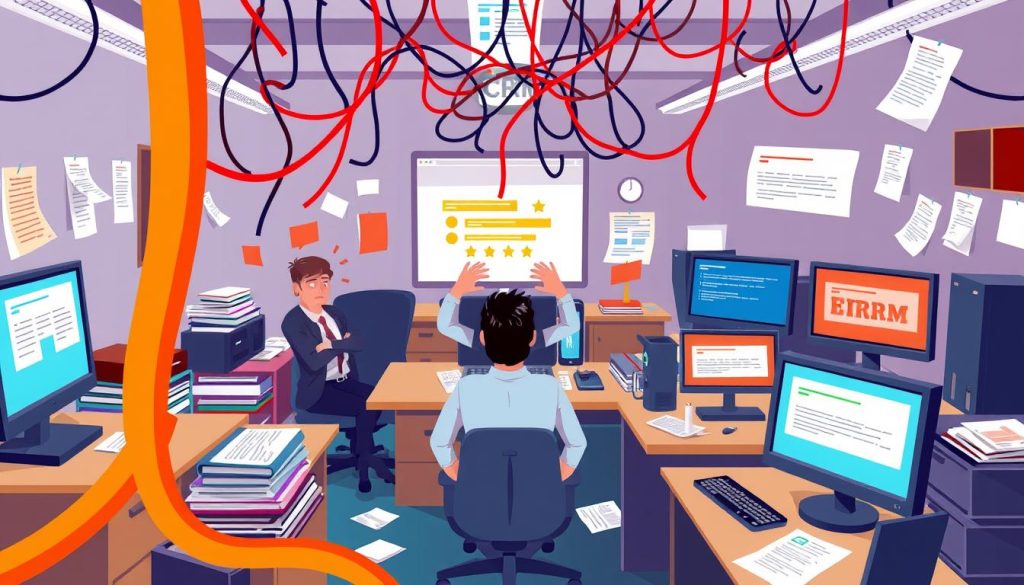
To beat these challenges, businesses need to plan well, train employees, and manage their CRM. By focusing on user adoption, data quality, and cost, companies can make their CRM work. This leads to better customer engagement, sales, and growth.
Choosing the Right CRM Solution
When picking a CRM for your business, it’s key to think about what you really need. Start by looking at your business goals, how you interact with customers, and what problems you face. This will guide you to find the right features and tools to make your work easier and improve customer relationships.
Then, look at what different CRM platforms offer to see if they fit your needs. CRM prices vary a lot, from $10 per user per month to thousands. Some offer free trials or versions with basic features, so you can try before you buy.
It’s also important to try out the CRM during a trial period to see if it’s easy to use and meets your team’s needs. Think about things like reporting, managing contacts, integrations, and automating workflows. These can really change how you sell, market, and serve customers.
By choosing the right CRM, you can make sure it works well for your business. Using CRM software can make your internal processes better and improve how you connect with customers. This can help your business grow and become more profitable.
When looking at CRM options, small business owners should ask about things like user minimums, how easy it is to integrate with what you already use, the total cost, setup fees, API access, and security. Some popular choices for small businesses include Salesforce CRM, Sage CRM, Keap, and monday Sales CRM.
By thinking about your business needs, comparing CRM features, and testing and evaluating them, you can pick the best CRM for your business. This will help change how you interact with customers and move your business forward.
Conclusion
A CRM tool can greatly help businesses of all sizes and types. It improves customer relationships, boosts sales, and makes processes smoother. It also gives us valuable insights into our customers.
By understanding CRM’s benefits and tackling its challenges, we can grow our businesses. This technology helps us work more efficiently and give our customers the best experiences.
Whether you run a small startup or a big company, the right CRM can change your game. It helps keep customers coming back, increases your earnings, and makes your team more productive. The benefits of a good CRM system are clear.
In today’s fast-changing business world, a strong CRM strategy is key. Using CRM helps us stay ahead, understand our customers better, and aim for lasting success. The path may have hurdles, but the benefits of a successful CRM are worth it.
FAQ
What is a CRM tool?
CRM stands for customer relationship management. It’s a system for managing all interactions with current and potential customers. CRM technology helps companies stay connected to customers, streamline processes, and improve profitability.
What are the benefits of using a CRM tool?
CRM solutions offer many benefits. They improve customer relationships and increase loyalty. They also boost sales and revenue. Plus, they help understand customer behavior and preferences through analytics.
How can a CRM tool help streamline processes and workflows?
CRM systems have marketing automation features. They help manage campaigns and lead customer journeys more efficiently. CRM also has sales process optimization tools. These tools help our sales team work more productively, automating tasks and providing visibility into the sales pipeline.
How can a CRM tool improve communication and lead nurturing?
A CRM provides a centralized platform for all customer interactions. This ensures everyone in our organization has access to the same up-to-date information. It helps our teams collaborate more effectively and provide a consistent, high-quality customer experience. The lead nurturing capabilities of a CRM also allow us to engage with prospects throughout the sales funnel, increasing the chances of converting them into customers.
How can a CRM tool help with targeted marketing and product development?
By leveraging customer data and insights gathered in our CRM, we can take a more personalized approach to our marketing efforts. This delivers the right messages to the right customers at the right time. It leads to increased customer satisfaction and loyalty as we demonstrate our understanding of their unique needs and preferences.
How can a CRM tool help identify our most profitable customers?
A CRM can analyze customer data such as purchase history, engagement levels, and lifetime value. It segments our customer base and enables us to prioritize our efforts on the accounts that are driving the most revenue and growth for our business.
What are some of the challenges of implementing a CRM solution?
Ensuring user adoption, maintaining data quality, and demonstrating a clear return on investment can be challenges. Addressing these challenges through proper planning, training, and ongoing management can help ensure a successful CRM implementation.
How do we choose the right CRM solution for our business?
When selecting a CRM solution, we should carefully evaluate our specific needs and requirements. We should start by assessing our business goals, customer interactions, and pain points. Then, we can compare the features and capabilities of different CRM platforms to ensure they align with our needs. Finally, we should test and evaluate the CRM solution during a trial period to ensure it is user-friendly, intuitive, and meets the needs of our team.



